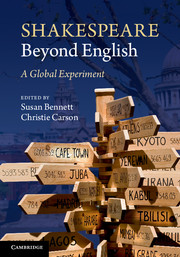Book contents
- Frontmatter
- Contents
- List of Illustrations
- List of colour plates
- Notes on contributors
- Foreword
- Acknowledgements
- Introduction
- The Globe to Globe Festival: An Introduction
- Performance Calendar
- Week One
- Week Two
- Week Three
- Week Four
- Chapter Twenty-Three Shakespeare 2012/Duchamp 1913
- Chapter Twenty-Four Foreign Shakespeare and the uninformed theatre-goer
- Chapter Twenty-Five The right to the theatre
- Chapter Twenty-Six ‘Playing’ Shakespeare
- Chapter Twenty-Seven Romeu e Julieta (reprise)
- Week Five
- Week Six
- Afterwords
- Index
- Plate section
Chapter Twenty-Four - Foreign Shakespeare and the uninformed theatre-goer
Part I, An Armenian King John
Published online by Cambridge University Press: 05 June 2014
- Frontmatter
- Contents
- List of Illustrations
- List of colour plates
- Notes on contributors
- Foreword
- Acknowledgements
- Introduction
- The Globe to Globe Festival: An Introduction
- Performance Calendar
- Week One
- Week Two
- Week Three
- Week Four
- Chapter Twenty-Three Shakespeare 2012/Duchamp 1913
- Chapter Twenty-Four Foreign Shakespeare and the uninformed theatre-goer
- Chapter Twenty-Five The right to the theatre
- Chapter Twenty-Six ‘Playing’ Shakespeare
- Chapter Twenty-Seven Romeu e Julieta (reprise)
- Week Five
- Week Six
- Afterwords
- Index
- Plate section
Summary
Accounts of Shakespearean productions produced by academics fall into two main categories: reviews written soon after a performance, incorporating varying proportions of evaluation and contextualization but largely consisting of eyewitness testimony; and more detailed analyses produced much later, which supplement the writer's first-hand experience of the show in question, if any, with information drawn from other sources – promptbooks and partbooks, published reviews, practitioner interviews, theoretical and theatrical manifestoes, and so on. What the two categories usually have in common is a claim to possession of all the relevant knowledge. Academic theatre reviewers generally position themselves as securely belonging to a production's target audience, so fully competent in its codes and its context that if they haven't understood it, nobody will; while academic analysts of productions from the recent or distant past similarly lay claim to an understanding of their full aesthetic and historical significance, a grasp of everything they sought to mean at the time, everything they succeeded in meaning and everything they have come to mean since. The opportunity to return to the Globe to Globe Festival's King John and Antony and Cleopatra some four months after seeing them, by contrast, offers me the chance to write something which is neither fully informed eyewitness reportage nor meticulously researched historical reconstruction. Instead, it constitutes a reflection on what may be left in the memory and the understanding of a theatre-goer who knew much less than usual about what he was seeing at the time, and has since learned that much of what he thought he knew was wrong.
- Type
- Chapter
- Information
- Shakespeare beyond EnglishA Global Experiment, pp. 190 - 194Publisher: Cambridge University PressPrint publication year: 2013

